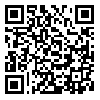Volume 28 - Supplementary
IBJ 2024, 28 - Supplementary: 116-116 |
Back to browse issues page
Download citation:
BibTeX | RIS | EndNote | Medlars | ProCite | Reference Manager | RefWorks
Send citation to:



BibTeX | RIS | EndNote | Medlars | ProCite | Reference Manager | RefWorks
Send citation to:
Ghorbani H, Hashemian M, Arjmand M, Makvandi M, Dasoumi H. Attitudes, Knowledge, and Implementation of Evidence-Based Medicine Among Iranian Residents and Physicians: A Systematic Review. IBJ 2024; 28 :116-116
URL: http://ibj.pasteur.ac.ir/article-1-4509-en.html
URL: http://ibj.pasteur.ac.ir/article-1-4509-en.html
Abstract:
Introduction: Evidence-based medicine (EBM) is the conscientious, explicit, and judicious use of current best evidence in making decisions about the care of individual patients. Given the rapid advancements in medicine, physicians must be able to make decisions based on the latest findings. The aim of this study was to map the current status of EBM in Iranian healthcare centers.
Search Strategy: This search focused on Persian databases and extracted all relevant studies on EBM published up to May 2024. Using keywords related to EBM, attitudes, awareness, and implementation, 10 cross-sectional studies were ultimately selected from "Google Scholar," "SID," "Magiran," and "IranDoc".
Results: In the context of attitudes toward EBM, all studies except one indicated that physicians and residents believe EBM positively impacts patient care. However, some respondents expressed doubts about implementing EBM in daily clinical decision-making. The studies revealed that the level of awareness of EBM among physicians and residents was generally moderate to low. Most participants could not implement EBM or conduct database searches. In one study, none of the 40 residents could answer a question related to designing a PICO model from a clinical question. The studies showed that the utilization of EBM is very low. In one study, only 6% of the residents used EBM in more than 50% of their clinical decisions. Many participants considered implementing EBM impractical due to the lack of legal requirements and the significant time needed to find relevant information. Sources for answering clinical questions varied, including printed books, experts' opinions, and the Internet.
Conclusion and Discussion: The findings of the study indicate that the role of EBM in clinical decision-making is limited. Therefore, physicians must participate in EBM courses. Additionally, legal requirements for implementing EBM can be beneficial.
Search Strategy: This search focused on Persian databases and extracted all relevant studies on EBM published up to May 2024. Using keywords related to EBM, attitudes, awareness, and implementation, 10 cross-sectional studies were ultimately selected from "Google Scholar," "SID," "Magiran," and "IranDoc".
Results: In the context of attitudes toward EBM, all studies except one indicated that physicians and residents believe EBM positively impacts patient care. However, some respondents expressed doubts about implementing EBM in daily clinical decision-making. The studies revealed that the level of awareness of EBM among physicians and residents was generally moderate to low. Most participants could not implement EBM or conduct database searches. In one study, none of the 40 residents could answer a question related to designing a PICO model from a clinical question. The studies showed that the utilization of EBM is very low. In one study, only 6% of the residents used EBM in more than 50% of their clinical decisions. Many participants considered implementing EBM impractical due to the lack of legal requirements and the significant time needed to find relevant information. Sources for answering clinical questions varied, including printed books, experts' opinions, and the Internet.
Conclusion and Discussion: The findings of the study indicate that the role of EBM in clinical decision-making is limited. Therefore, physicians must participate in EBM courses. Additionally, legal requirements for implementing EBM can be beneficial.

| Rights and permissions | |
 |
This work is licensed under a Creative Commons Attribution-NonCommercial 4.0 International License. |







.png)
